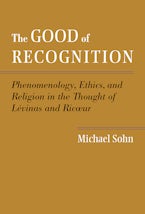In this new and exciting book, Michael Sohn offers a fresh perspective on the concept of recognition by interfacing the ethical project of Emmanuel Lévinas with the work of Paul Ricœur. By interfacing these two figures in particular, Sohn also helps us see the similarities and differences in thinking through Christian and Jewish ethics, an important relation for both thinkers but certainly for readers of Emmanuel Lévinas. His book is a significant contribution to the secondary literature not only on Levinas and Ricœur, but also to those working thematically on recognition--including Hegel scholars, scholars working on psychoanalysis, and feminist theorists.
~Claire Katz, Professor of Philosophy and Women's and Gender Studies, Texas A&M University
Michael Sohn makes a significant contribution to the contemporary debates in philosophy of religion and political philosophy while pushing them in important new directions, impressively offering an account of recognition that is both theologically sophisticated and also historically aware. This book demonstrates that sophisticated work in continental philosophy can still be clear, lucid, and convincing.
~J. Aaron Simmons, Associate Professor of Philosphy, Furman University
An erudite and impressive work of seminal scholarship, The Good of Recognition: Phenomenology, Ethics, and Religion in the Thought of Levinas and Ricoeur will prove to be an enduringly valued addition to academic library Philosophy Studies collections in general, and a critically important addition to the supplemental studies reading lists for students of the lives and works of Emmanuel Levinas and Paul Ricoeur in particular.
~John Burroughs, Midwest Book Review
The Good of Recognition provides an excellent introduction for any reader who is approaching Levinas or Ricoeur for the first time as well as for those who are already familiar with their work but seek to understand it more deeply.
~Scott Davidson, Oklahoma City University, Philosophy in Review
Sohn’s work is ambitious, but it achieves its ambition in an intellectual tour de force. His reading is nearly exhaustive and explicated with laudable clarity.
~Sean Lawrence, Continental Philosophy Review
A valuable reference tool for Lévinas and Ricoeur studies, especially those that focus on the phenomenology, religious thought, ethics, or politics of these two men.
~Levi Checketts, Journal of the Society of Christian Ethics

